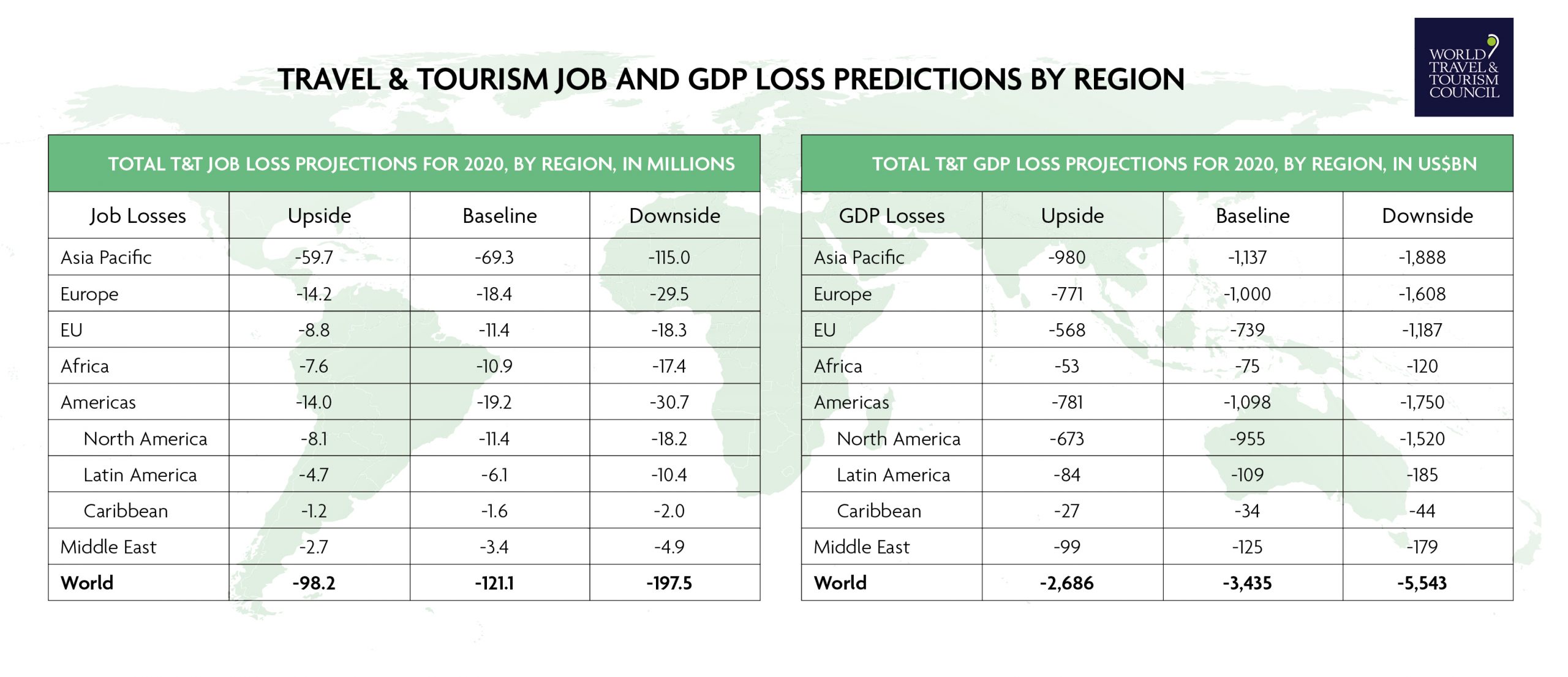
WTTC says governments must act now to save sector
Avoiding the worst case

New research from the World Travel & Tourism Council (WTTC) reveals that over 197 million jobs could be lost in the global travel and tourism sector if barriers to global travel – such as blanket anti-travel advisories and quarantine measures – remain in place.
The staggering potential job loss numbers are based on WTTC economic modelling, which looks at the impact faced by the travel and tourism sector amid local and global travel restrictions as a result of COVID-19.
In the worst-case scenario – where restrictions were lifted after the summer — the impact would be more significant, putting a total of 197.5 million jobs at risk. This represents an alarming 96% rise from the most recent 100.8 million jobs that the WTTC had previously estimated to be under threat from the coronavirus pandemic.
Its research also reveals that if these travel restrictions were removed sooner, it could save a staggering 99.3m jobs.
The impact of prolonged travel restrictions could also wipe out $5,543 billion in the sector’s contribution to global GDP, equating to a 62% drop compared with 2019.
The WTTC’s worst-case scenario saw global international arrivals suffering a sharp decline of 73%, while domestic arrivals would drop by 64%.
WTTC president & CEO, Gloria Guevara commented: “We are deeply saddened by the loss of so many lives and the devastating impact on families around the world because of the COVID-19 pandemic.”
Guevara continued: “This terrible virus has also had a crushing global socio-economic impact, which is threatening the jobs of millions of people who very livelihoods depend upon a thriving travel and tourism sector for their survival.”
And she observed that: “Unfortunately, our new modelling reveals the depth of the long-term impact facing the global Travel & Tourism industry if travel restrictions continue for an extended period of time.”
Guevara pointed out that: “Under our worst-case scenario, prolonged travel restrictions could put more than 197 million jobs under threat and cause a loss of more than $5.5 trillion to global Travel & Tourism GDP.”
The WTTC’s boss continued: “The sector’s recovery will be delayed by heavy-handed restrictions just as it emerges from one of the most punishing periods in its history – in addition to the airlines, the entire travel ecosystem will suffer including millions of SME’s.”
And she added: “Hotels, destinations, travel agents and others will all be devastated by the economic domino effect of prolonged restrictions on movement, plunging millions of travel businesses and their employees into financial ruin.”
The WTTC also looked at a baseline scenario in which current restrictions start to ease from June for regional travel; July for short-haul or regional travel; from August for mid-haul; and from September for long-haul.
In this scenario, a total of 121.1 million jobs could be lost in the global travel and tourism sector, with a loss of $3,435 billion in global GDP. Meanwhile, global visitor numbers would drop by 53% for international arrivals and by 34% for domestic arrivals.
In the WTTC’s best case scenario, current measures start to ease from June for short-haul and regional travel; from July for mid-haul; and from August for long-haul.
In this scenario, a total of 98.2 million jobs could be lost in the Travel & Tourism sector, half the number in the worst-case scenario, with a loss of $2,686 billion in global GDP. Meanwhile, global visitor numbers would drop by 41% for international arrivals and by 26% for domestic arrivals.
And while the WTTC makes it clear that the best-case scenario would still result in a devastating blow for travel and tourism, this outcome avoids unnecessary additional harm to the sector as a result of prolonged travel restrictions and protects almost 100 million jobs around the world that could otherwise be lost.
To achieve its best-case scenario, the WTTC says that governments around the globe need to follow its four-point plan.
For more on this, go to https://wttc.org/COVID-19/Safe-Travels-Global-Protocols-Stamp.
